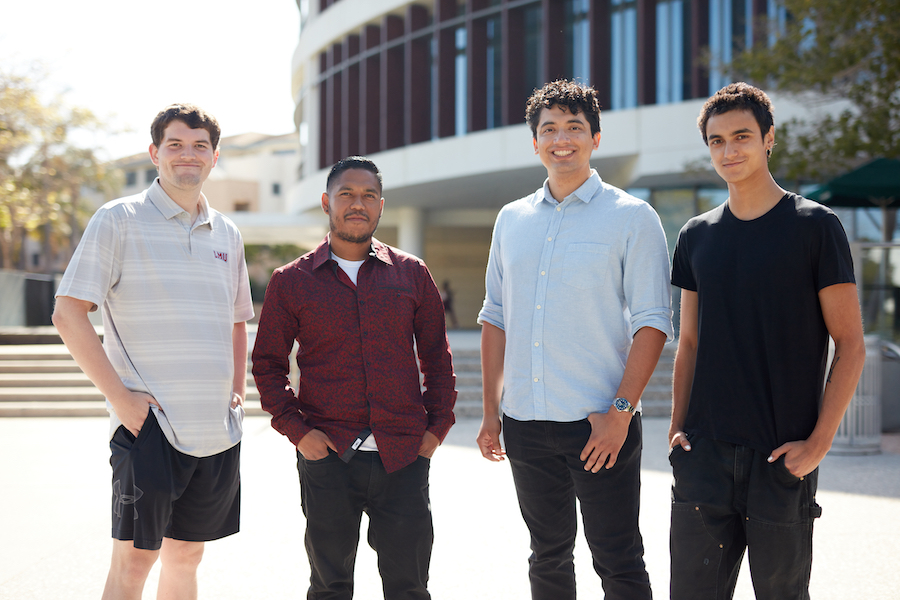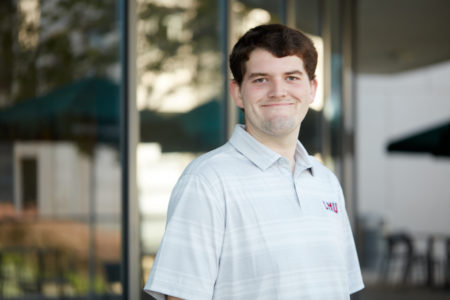
It’s a perfect underdog story: Students who had fallen behind in their classes and received less-than-stellar grades decided to buckle down. Through hard work and dedication, they come back stronger than ever, earning a spot on the prestigious Dean’s List for their academic achievements. And all of this within one semester. How does this happen?
When students are placed on academic probation, it means that their grades for a semester or cumulatively have dropped below 2.0, putting them in danger of temporary disqualification from the university. These students are then given individualized support and coaching from the LMU Bellarmine College of Liberal Arts Advising Center to improve their academic performance and, hopefully, remove their probationary status.
Will Wences, one of the BCLA advisors, specializes in helping students get off academic probation. But he doesn’t stop there. He encourages his advisees to set their sights on the Dean’s List, a semester GPA of 3.5 or better, and to use academic probation as an opportunity to utilize resources such as one-on-one check-ins, specialized communications, and group advising workshops to push past difficulties and learn how to successfully navigate the curriculum. Not all probation students commit to this intensive program, but for those who do, the results are proving extremely effective. In spring 2022, 97 BCLA students were removed from academic probation. Of those who chose to go further and undertake intensive work with Wences, seven were able to make the Dean’s List the very next semester, and 15 more made the Dean’s List within two semesters of being placed on academic probation.
What inspired the BCLA Advising team to undertake these new strategies? Rebuilding and running the academic probation process was a chance for Wences to put his passion into practice, balancing student accountability with caring, concerned, and structured support. “It’s easy to say a student has deficient grades and that they need to improve, but the real challenge comes with understanding why the student had low grades, and what exactly must be done to improve,” Wences explains.
Wences first worked as a graduate assistant in the BCLA Advising Center in the Dean’s Office while completing his master’s degree in English at LMU. He recalled, “This role was transformative as it allowed me to realize how much I loved working directly with students and assisting them with clarifying university policies and navigating course selection, and of course the role instilled a kind of professionalism that helped me develop.” Taking insights from his GA position, Wences applied for and accepted a position as a professional advisor in 2019 and immediately leaned into improving the academic probation process under the supervision of former Assistant Dean Janet Vera, Ed.D.
The BCLA academic probation process now includes tailored workshops, individualized communication, and professional advisors working in conjunction with faculty advisors, all to ensure that these students don’t fall through the cracks. Wences said, “It goes hand in hand with LMU’s approach of having students feel as supported as possible, and to know that they have this safety net of people who are invested in their success.” This is also why the probation process ensures that each student’s needs are carefully understood and addressed. This type of advising works to demystify academic probation, while also giving students practical, personalized, and actionable study habits to cultivate essential skills for learning, work, and life. Through these workshops, BCLA advisors “plant the seed” that not only can students get off probation, but they can also excel, even so far as to make the Dean’s List. “It’s about creating an upward trajectory,” says Wences, “promoting a positive narrative of accountability, aspiration, and advancement.”
BCLA’s high impact advising model is yielding results; these students agreed to share their stories to illustrate their success.
Lucas Mathison’s first semester at LMU was a period of adjustment. Responding to the anxieties caused by a return from COVID shutdowns, pressure to make friends, and lack of an ability to prioritize caused Mathison to fall under academic probation. This brought him to the BCLA Advising Center, and specifically to Wences, who assisted Mathison as his second semester at LMU began.

“Receiving that letter of academic probation made it real,” said Mathison, “and I knew that it was time to buckle down.” Mathison found email reminders and other communications helpful in keeping him accountable, and the academic advancement workshops taught him valuable study skills. “I got to discuss my struggles with [Wences], and it was not just conversation; he would give me concrete and relevant advice during our meetings,” Mathison reflects. “The relationship felt genuine. I felt like [Wences] cared about me.”
With Wences’ advice and the academic probation process’ resources, Mathison was able to make the Dean’s List by the end of his second semester. He said, “Without academic probation, I don’t know if I would have gotten the high GPA I did this semester. I feel proud of myself not because of the grades, but because of how hard I worked. With the help of the BCLA Advising Center, I learned what worked for me, and now those study habits will last forever.” Mathison utilized the academic probation process to facilitate broader self-reflection. In taking stock of academic interests, he also identified other interests and is enjoying a newfound love for fashion. “It is so important for students on academic probation to identify things they love to do outside of school, too, as it helps mentally balance school and personal/work time,” said Wences.
William Dickens’ story is similarly inspiring, as he too achieved a spot on the Dean’s List just a semester after being placed on academic probation, and then went on to make the Dean’s list again for spring 2022. Transferring to LMU during the coronavirus was a challenging time for Dickens. He felt that he had been coasting through school while other areas of his life spiraled out of control. Finally, his grades followed.
“It was a make-or-break moment for me because I realized that I needed to change and make better choices,” said Dickens. “When you hear academic probation, you see the requirement, and your heart drops for a minute. But BCLA Advising helped me come to peace with what I had done and to know, within myself, that I could fix this.” For Dickens, coming out of academic probation would mean accepting his situation, taking responsibility for improving it, and trusting in the process.
His relationship with the academic advisors, including Sarah Burtch and Isabel Solano Robles, in addition to Wences, helped him get on the right track: “Meeting with them helped a lot because I was able to talk to someone one-on-one, even form a relationship, and have someone to be able to give an update to. It helps to have people who know my history and can validate my improvement. I know if I have any troubles or concerns, I can turn to BCLA Advising for support,” said Dickens. This validation led him to get out from under his probationary status and onto the Dean’s List by the end of the semester.

“After making the Dean’s list once, it made me look at myself in a better light. I don’t have to be the B-average student; I can be an A student … academic probation is really an opportunity for students to learn how to shine.” Reflecting upon his hard work and journey, Dickens said, “It is nice to look ahead and to know that our struggles mean something and can amount to this great reward at the end. Academic probation wasn’t the end; it was actually the beginning to a new me.” Indeed, Dickens’ academic confidence poured into other areas of his life as well. He lost 100 pounds in his first semester on the Dean’s List and is now experiencing greater emotional and physical health, balance, and happiness. “Again, balance in life is so important,” said Wences. “Doing nothing but school can be incredibly draining, and finding that balance that helps you mentally reset is key to success.” This, Wences said, is all part of the signature holistic education in the Ignatian tradition that makes LMU special and distinctive.
Aaron Padilla also struggled during his first year at LMU. He was unsure of how to balance school, social life, and personal interests. “I realized I was in the wrong major,” Padilla said. “I spent a lot of time engaging socially while letting certain assignments slide, and skipping class every once in a while. I wasn’t enjoying my education or paying attention to my mental state.”
His choices eventually led to academic probation. After meeting with a professor and the Community of Care, Padilla switched his major to journalism and sought out support from the BCLA Advising Center. “A lot of faculty and staff stepped in to assist me,” he said. “They helped me construct an academic plan and establish goals for myself, especially while changing majors, which I had no idea how to manage.” It was through this process that Padilla found the community he needed.
“When I think through the past few years, it was about the relationships that I built,” said Padilla. His experiences with Wences, the BCLA Advising Center, and the larger LMU community were critical in helping him reframe his relationship to academic life. Padilla noted, “Their advice helped me practice keeping a consistent schedule, even designating specific times for waking up, eating, and working on homework … I made drastic changes.” These changes had an even bigger cumulative effect. “For me it wasn’t just about making the Dean’s List, it was about putting myself in a more positive environment. That is the easiest way to do well in your classes. Stay active in the classroom and stay active outside of the classroom.”

In working to achieve this balance, Padilla has built a life that fosters professional, academic, and personal harmony. “You can’t expect yourself to do your best in school without having order in your personal life,” he said. Padilla now exercises consistently, attends therapy, and focuses on his relationships with others. When he switched his major to journalism, he also identified a passion for tracking down, writing, and sharing stories. “I feel more content in a major that I enjoy doing,” says Padilla, who now promotes “humanizing your degree.” Coming from a place of understanding and clarity, Padilla has come to understand that, “LMU is much more than a degree. Explore everything that this university has to offer. What you put into this place is what you get out of it.”
Students such as Mathison, Dickens, and Padilla embody both struggle and success, which is a source of inspiration for all students to keep achieving from wherever they are on their personal and academic journeys. These students also affirm the positive impact of academic advising on the BCLA undergraduate experience. “I challenge each and every student on academic probation to aim for the Dean’s List and reach for the stars,” said Wences, who plans to pursue a doctorate of education in educational leadership at USC, where he also will direct advising services in the USC Viterbi School of Engineering. “I instill in students that it’s not so much about what led to academic probation, but about identifying what needs to change, and how much they are willing to turn things around. I always knew that student-centered roles were my passion.”



